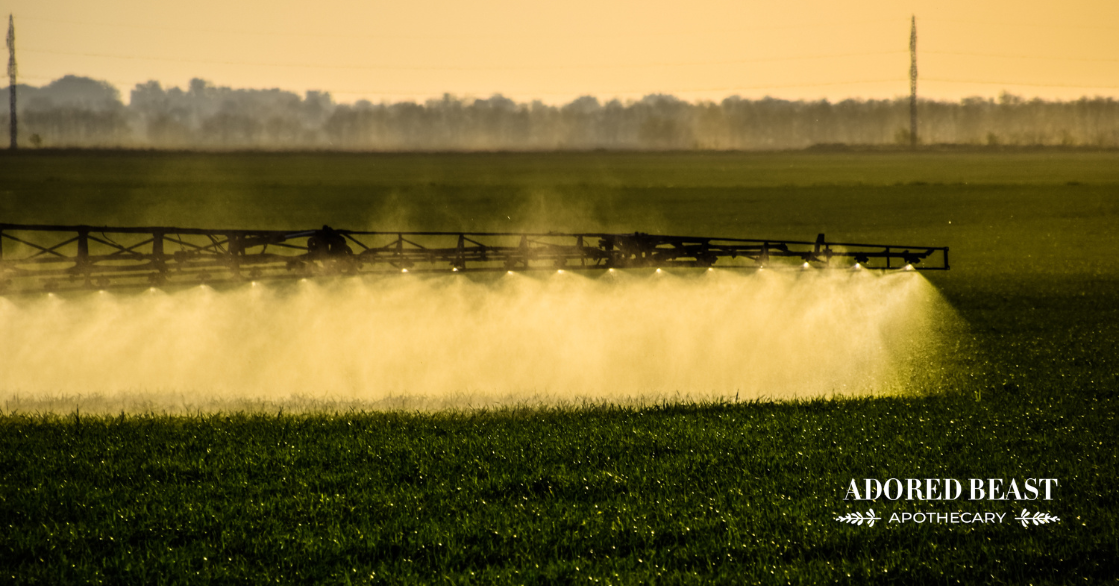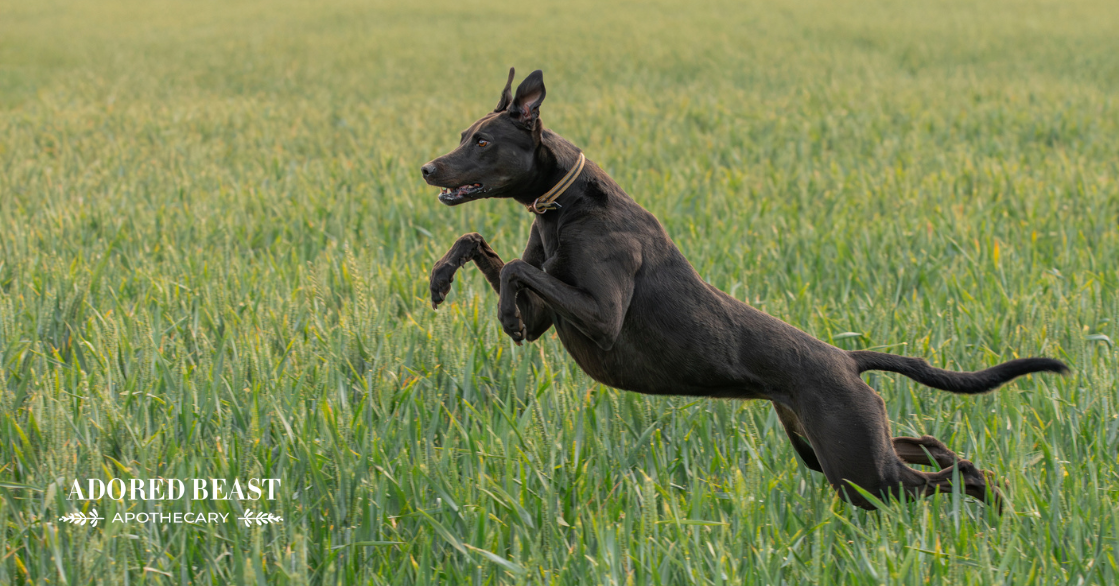As many of you who follow me know, I drone on about glyphosate in horse feed on a regular basis. I haven’t written an article specifically on the subject and I thought it was an important one to flush out.
Glyphosate is only one of many harmful herbicidal chemicals that can be present in your horse’s feed. The scary part is that this chemical, despite its many side effects, does not need to be listed as present on the ingredient list so it can be hard to navigate unless you understand how the commercial agricultural industry works. This article is about your horse’s health but it’s also about our own health and the health of our planet.
What is Glyphosate?
The history of glyphosate is disturbing. It was first synthesized in 1950 by Henry Martin, a Swiss chemist, and was later patented as a chemical chelator in 1964 by Stauffer Chemical Co (Monsanto). Monsanto was also the creator and distributor of Agent Orange, used extensively in the Vietnam War as a chemical weapon. Glyphosate was discovered to be able to chelate (bind to) minerals such as calcium, magnesium, manganese, copper, and zinc. It is also patented as an antibiotic and antifungal agent.
It was introduced to the agricultural market in 1974 as an herbicide and desiccant for wheat under the name Roundup. Then in 1996, Monsanto Co. introduced the first bioengineered crop: genetically modified/Roundup resistant soy. From this point forward, industrial use of Roundup has increased year over year with more genetically modified crops being introduced. In the USA alone, 300 million pounds of glyphosate are sprayed on farmland every year.
In September of 2021, Health Canada increased the safe allowable spraying limit by 2 and 3 times the previous limits for peas, beans, and tree nuts. This brings our allowable use in Canada up to higher levels that what even the USA allows to be sprayed. Weeds have become resistant to these chemicals and need to be sprayed in higher concentrations to be killed. But the environmental impacts are dire, as you’ll see below.
Glyphosate in Horse Feed: Where is it Found?
As mentioned above, soy was the first crop to be genetically modified and now all soy grown in the USA and Canada is genetically modified (GMO) and “Roundup Ready”. Other crops that are widely genetically modified to withstand Roundup include wheat, corn, beans, peas, sugar beets, canola, cotton, flax, alfalfa, barley, and tree nuts.
If you review the ingredients in your feed bags, you will most likely find one or more of these crops are included. Unfortunately, as I mentioned above, glyphosate does not need to be listed as an ingredient in your feed and it’s a hidden danger that needs attention.
Environmental Impacts
Glyphosate is a water-soluble chemical that does not biodegrade easily in soil. In laboratory testing, biodegradability time was favourable but when testing was done in the field, several factors impeded bioavailability, including the presence of aluminum iron, manganese, and zinc. It can bind to all of these metals and remains fixed in the soil for up to one year depending on soil composition. (1) A 2020 study showed that even in cleaner areas like Nova Scotia, rivers are contaminated with aluminum and affecting the salmon populations there. (2) The addition of glyphosate along with aluminum makes for an even larger problem for aquatic life.
Another factor in biodegradation is soil microbes. Since glyphosate is a patented antibiotic, it can render the soil sterile when sprayed regularly and in the absence of a microbial community, the glyphosate remains fixed. (1)
Early claims were made that glyphosate does not leech into groundwater but since these initial claims were made, other studies have shown that it can leach into groundwater and affect aquatic microbial communities. (1) At the rate this chemical is being sprayed, there is significant risk to our ecological water systems. Even back in 2002, 51 midwestern US streams were tested and found to contain glyphosate. (3)
Glyphosate has also been found to exist in both the air we breathe and in rainfall, further debunking claims from producers of glyphosate that it does not run off into the environment. (4)
Glyphosate is a water-soluble chemical that does not biodegrade easily in soil. In laboratory testing, biodegradability time was favourable but when testing was done in the field, several factors impeded bioavailability, including the presence of aluminum iron, manganese, and zinc. It can bind to all of these metals and remains fixed in the soil for up to one year depending on soil composition. (1) A 2020 study showed that even in cleaner areas like Nova Scotia, rivers are contaminated with aluminum and affecting the salmon populations there. (2) The addition of glyphosate along with aluminum makes for an even larger problem for aquatic life.
Another factor in biodegradation is soil microbes. Since glyphosate is a patented antibiotic, it can render the soil sterile when sprayed regularly and in the absence of a microbial community, the glyphosate remains fixed. (1)
Early claims were made that glyphosate does not leech into groundwater but since these initial claims were made, other studies have shown that it can leach into groundwater and affect aquatic microbial communities. (1) At the rate this chemical is being sprayed, there is significant risk to our ecological water systems. Even back in 2002, 51 midwestern US streams were tested and found to contain glyphosate. (3)
Glyphosate has also been found to exist in both the air we breathe and in rainfall, further debunking claims from producers of glyphosate that it does not run off into the environment. (4)
Health Impacts
So, if just the run-off from glyphosate can affect our environment in these major ways, think of the implications when it comes to human and animal health. We are all eating and drinking this chemical on a daily basis. Even those of us who eat 100% clean, certified organic plants and animals are still exposed to this chemical on a regular basis.
In 2015, the University of California San Francisco found that 93% of urine samples tested (131 people) contained glyphosate. (5) In 2020, Bayer (who purchased Monsanto in 2018) settled litigation claims that glyphosate causes cancer (in particular non-Hodgkin’s lymphoma). It has currently paid out $10 billion in 95 000 cases and still faces litigation in 30 000 more cases. (6)
Glyphosate causes dysbiosis of the gut bacteria since it’s a patented antibiotic. It can also cause neurological changes. (7) Since gut disease, colic, and neurological disease are some of the most common diseases in horses, up to and including causes of death, it is vital that you do everything you can to get glyphosate out of your horse’s life.
Animal health studies by Dr. Anthony Samsel have revealed that glyphosate-sprayed feed can be tracked from the feed into all tissues of horses, including the hoof tissue, causing degeneration of hoof tissue. Urine and manure were high in glyphosate. Blood was also contaminated and will circulate through all body tissues. Scleroderma was also studied in humans by the same scientist and their defective fingernails were found to be contaminated with glyphosate as well. (8) Dr. Samuel’s paper on the far-reaching implications of how glyphosate can be mistakenly written into protein synthesis in mammals was published in 2016. (9) His paper shows that glyphosate is most likely involved in the increased development of diabetes, obesity, asthma, chronic obstructive pulmonary disease (COPD), pulmonary edema, adrenal insufficiency, hypothyroidism, Alzheimer’s disease, amyotrophic lateral sclerosis (ALS), Parkinson’s disease, prion diseases, lupus, mitochondrial disease, non- Hodgkin’s lymphoma, neural tube defects, infertility, hypertension, glaucoma, osteoporosis, fatty liver disease, and kidney failure.
For more information on the environmental and health implications of glyphosate, check out triple board-certified specialist Dr. Zach Bush’s video here. And, if you’d like to explore more on this subject, there are hundreds of peer-reviewed papers available online about its harmful effects on people, animals and our environment.
Eliminating Glyphosate in Horse Feed
It’s surprisingly easy to eliminate glyphosate in horse feed from the diet if you know what to look for. Here’s your checklist for doing so:
- Eliminate extruded feed from the diet and any conventionally-grown grain or legume crops which includes wheat, corn, soy, lentils, flax, and sugar beets.
- Seek out certified organic or non-GMO feed sources, often coming from Europe where glyphosate regulations are much more strict.
- Never use herbicide anywhere near grazing fields and ideally, never spray glyphosate on your property.
How can you protect your horse from the harmful effects of glyphosate?
There are some extra measures you can take to ensure that you are doing everything possible to minimize the effects of glyphosate by employing the following methods:
- Use gut-protective supplements including probiotics and n-acetyl glucosamine which both strengthen the microbiome and decrease gut lining inflammation.
- Use gut-protective herbs including marshmallow root, licorice root, slippery elm bark, and aloe vera.
- When it comes to forage, don’t feed a mono diet. Offer several no-spray hay sources to increase the variety of fibres the microbiome has access to.
- Herbs are prebiotics too! Feed a variety of herbs including dandelion, clovers, dried nettle, rose hip, meadowsweet, and more. Ideally, your horse has access to live plants in a field, but if they can’t, be sure to provide a rotation of dried herbs to their diet.
- Non-GMO/molasses-free beet pulp is a great prebiotic fibre that also contains a high calcium content which is a mineral that is often hard to balance in equine diets.
- Medicinal mushrooms and herbs are a wonderful addition to provide antioxidants and adaptogenic properties to your horse’s diet. Antioxidants and adaptogens can help your horse’s immune system deal with toxic intake and inflammation. Include a rotation of chaga, lion’s mane, turkey tail, reishi, ashwaganda, milk thistle, barberry, and greater celandine.
Glyphosate in horse feed, as in any food – human or animal – is a major issue, one we need to take seriously. The health impacts are long lasting, and the environmental impacts far reaching. Taking a few extra steps to eliminate it as much as possible is the best way to protect your equine companion.












